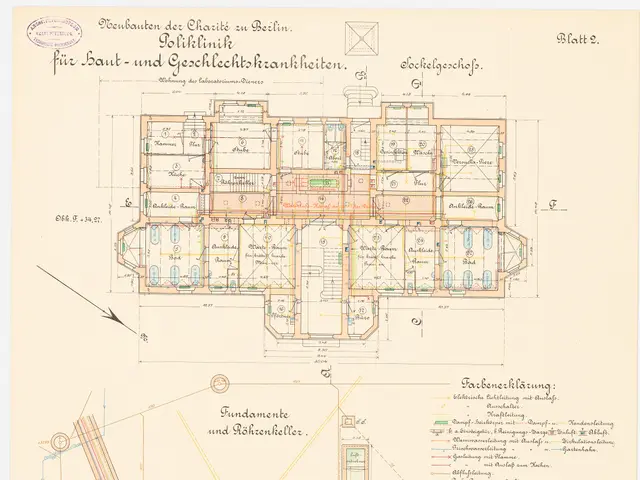MPs Debate Matters in Germany's Federal Parliament This Week
In recent developments, the German government has announced several key decisions aimed at supporting various sectors of society.
Firstly, the federal government has pledged one billion euros to cover costs related to childcare, schools, health, and care for Ukrainian refugees. This comes as over 400,000 Ukrainian refugees have found protection in Germany, including many students, educators, and researchers.
The economic recovery will be bolstered by additional investment incentives for businesses in Germany. This move, announced on the 19th of May, is part of the government's efforts to stimulate growth and support the country's economic resilience.
In education, the coalition factions have proposed to facilitate access to education and research for refugees from Ukraine. Additionally, they have extended the deadline for submitting tax returns for the tax years 2020 to 2024.
On the 18th of May, the German federal government adopted key points for the establishment of the Future Center for German Unity and European Transformation. Although specific details about the center's current status or projects are not readily available, the center is an institution aimed at promoting research, dialogue, and initiatives aimed at shaping the ongoing political, economic, and social unification processes in Germany and the broader European context.
The construction of the Future Center will be preceded by a competition among interested municipalities in East Germany. The center aims to create a place for practical engagement with societal transformation, strengthening representative democracy, and cohesion in Europe.
In foreign affairs, Germany continues to participate in the UN mission MINUSMA in Mali, with the German military mandate being increased to 1,400 soldiers and extended until 31 May 2023. The government is also discussing a draft bill of the Sanctions Enforcement Act I to address issues in enforcing sanctions against Russia for violating international law.
The Regionalization Act is being amended to increase financial resources to compensate for expected COVID-19 damages in 2022 and provide the foundation for financing the additional costs of the 9-euro ticket. This ticket, a discounted public transport ticket for three months, is being introduced to provide immediate relief to citizens and encourage energy savings.
Lastly, the LNG Acceleration Act is being initiated to speed up all licensing and permitting procedures for both floating and stationary LNG terminals due to the potential threat of a gas shortage in Germany. The draft bill aims to create the possibility of identifying assets of sanctioned persons and securing assets until the ownership relations are clarified.
These developments underscore the German government's commitment to supporting its citizens, fostering economic growth, and engaging in international affairs, particularly in the context of the ongoing war in Ukraine and the global energy crisis.
- The investment in childcare, schools, health, and care for Ukrainian refugees indicates Germany's dedication to improving overall societal well-being, a part of the broader field of workplace-wellness.
- The economic stimulus for businesses in Germany could lead to better job opportunities, potentially improving the health and wellness of workers by reducing stress and increasing financial stability.
- Medical conditions such as chronic kidney disease, COPD, and type-2 diabetes might require specific care and resources, aspects that the government's financial support could address.
- Cancer, a significant health issue, could benefit from increased funding for research and treatment due to the economic recovery efforts.
- Respiratory conditions like COPD and potential respiratory issues related to climate change could be areas of focus for health and wellness initiatives.
- The establishments of new centers, like the Future Center for German Unity and European Transformation, could foster research in fields like environmental science, policy, and politics.
- The financing for the 9-euro ticket could support fitness and exercise by making public transportation more affordable, encouraging physical activity.
- Sexual health education and resources could be facilitated through improved access to education and research for refugees, as proposed by the coalition factions.
- Family health could be strengthened by the financial support provided to refugees, ensuring better living conditions and access to healthcare.
- Alzheimer's disease and other neurological disorders could benefit from the research and dialogue promoted by institutions like the Future Center.
- Autoimmune disorders, such as rheumatoid arthritis, might find improved therapies and treatments due to increased research funding.
- Climate change could be addressed through initiatives promoting energy efficiency and renewable energy, like the LNG Acceleration Act.
- Mental health issues could potentially be alleviated by the provision of immediate relief to citizens through the 9-euro ticket.
- Men's health could be impacted by these developments, from improved access to healthcare for Ukrainian refugees to the potential job opportunities created by economic growth.
- Skin care, particularly addressing skin conditions like psoriasis, could be influenced by investments in health and wellness initiatives.
- Therapies and treatments for various medical conditions could see advancements through increased research funding, as supported by the economic recovery initiatives.
- Nutrition plays a crucial role in overall health, and the economic stimulus could help improve access to nutritious food for all Germans.
- Aging could be affected by the support provided to Ukrainian refugees, who might have varying age ranges and consequently different health needs.
- Women's health, including reproductive health and breast cancer research, could see improvements through increased research funding and access to healthcare.
- Parenting could be impacted by the childcare support provided to Ukrainian refugees, helping them create stable homes for their families.
- Weight management could benefit from increased access to fitness and exercise opportunities made possible by the 9-euro ticket.
- Multiple sclerosis and other complex health issues could be addressed through research supported by the German government's investments.
- Migraine sufferers might find relief as a result of the mental health benefits associated with the 9-euro ticket.
- Cardiovascular health could be influenced by the potential reduction in stress levels due to financial stability and improved access to healthcare.
- The ongoing global energy crisis could be mitigated through initiatives like the LNG Acceleration Act, aiming to secure energy resources.
- The involvement in international affairs, such as the UN mission in Mali, demonstrates Germany's commitment to global peace and security, an essential aspect of foreign policy.
- The draft bill of the Sanctions Enforcement Act I could address financial issues related to commerce, including the finance sector and potential conflicts of interest in business transactions.








